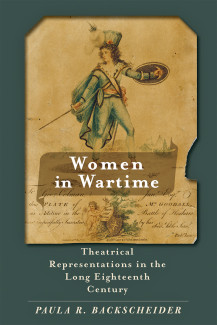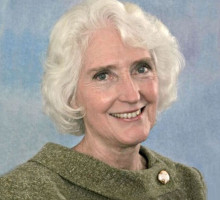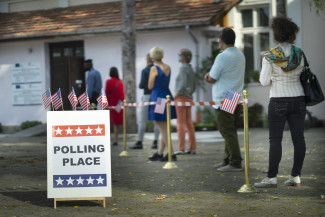
Who Makes Meaning? What Does My New Book Do?

by Paula Backscheider, author of Women in Wartime: Theatrical Representations in the Long Eighteenth Century
Last night UPS delivered a book including an essay of mine. The contributor’s list gave my title as Wartime Women: Intimate Conscripts on the British Stage rather than my publisher’s. For me, the book had always been about a group of some thousands of women and the playwrights and actresses who brought them to the London stage in the eighteenth century. It is the first study of theatrical representations of women with intimate connections to military men— sweethearts, wives, mothers, sisters, barmaids, provision sellers, seaport prostitutes, and more. Their relationships to active duty men made them recruits, volunteers, or even conscripts, women compelled into service by love, need, or duty. Like the impressed men, many would not have chosen this path.
I had often struggled with the marketing staff to avoid these women becoming stereotyped “warrior women,” and their title was the result of what they considered “searchable” words. The real women conscripts and the real characters played by other real women were not real to them. Cultural studies critics like me always ask, “What work does an artefact do?”
My book set out to do real work. I asked a specific question: How can theatre respond to wartime crises? How are women used to meet the most urgent needs?
I answered these clear and simple questions and used them to continue my career-long exploration of what popular culture has come to do today. In Spectacular Politics, I demonstrated that mass popular culture began in the late eighteenth century with the mania for gothic plays that were recognized and criticized as threatening to “drive all other plays off the stage.” Theatres that held audiences of over 3,500 filled night after night enthralled by unimaginable evil, madness, and the sensations the plays raised in them. People screamed, cried, applauded, and even fainted.
The plays featured in my book also created a massive, addicted following. From box office receipts, David Worrall estimates an audience of 3000 at The Death of Captain Faulknor (1795), a short, slight play about a victory off Guadeloupe. In theatres that held that size audience, some such topical plays ran many nights. The Mouth of the Nile (1798), for instance, played for thirty-two as the audience celebrated Nelson’s victory over Napoleon. Frustrated conventional playwrights complained that people talked over or skipped the main pieces and flocked to their seats for these short, spectacular pieces.
Popular culture is easily available, affordable, familiar to a large number of people representing several social classes, and so widely discussed that first-hand experience is not always necessary. Like most popular culture, the plays were ephemera, produced by and part of a cultural moment. And how did a subgenre with a formulaic plot, character configuration, and mood achieve the status of mass popular culture? What was the unusual appeal and what work was it doing for the society?
And, as important as the description of what theatre can do to contribute to military success, the more valuable is my exploration of not only the immediate work popular culture can do but of how popular culture is an important catalyst for change, often lasting change.
Women in Wartime is actually a case study in these things. In a series of blogs, I will share what unexpected things I discovered about my subject, my readers, and myself. The blogs are inspired by two groups of meaning makers. One draws upon the observations about my project and methods that my professional friends made, and the other is based on evidence from the spontaneous and surprised enjoyments non-specialist readers shared with me.
(See news item Military Recruiting).



